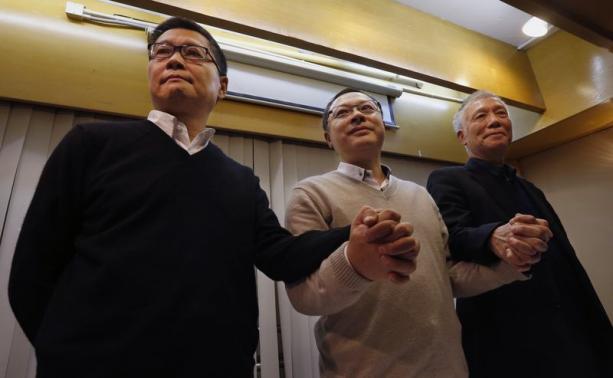After advising the remaining student protesters to leave the streets, three leaders of the Occupy Central movement turned themselves in to police today, in what turned out to be a somewhat anticlimactic move. From Elizabeth Barber at Time:
Hong Kong University law professor Benny Tai, Chinese University social-studies professor Chan Kin-man and Baptist cleric the Rev. Chu Yiu-ming sought to turn themselves in for violating Hong Kong laws on unlawful assembly. But they left Central Police Station less than an hour later, still free men.
They were joined in seeking arrest by several other high-profile supporters of the movement, including the Catholic Cardinal Joseph Zen, who also walked in, and then out, of the police station.
“We are not being arrested,” said Tai, speaking to press outside the station. He added, though, that he believed police might still arrest him and others at a later stage and charge them with more serious crimes. [Source]
Meanwhile, more students joined the original three who declared a hunger strike on Tuesday and they vowed to continue with the strike until their demands were met. Chris Lau and Jennifer Ngo of the South China Morning Post report:
Joshua Wong, 18, said the three would carry on with the plan, vowing to only drink water or consume a glucose solution if advised to by doctors.
“We want to let the public know that the hunger strike we’re on now is a serious one. We want to refocus the public attention on the umbrella movement,” he said.
The three students announced their plan to go on an indefinite hunger strike on Monday, a day after the Federation of Students’ failed attempt at escalating action.
As an alternative tactic, the trio wanted to use the hunger strike to press the government to launch a dialogue with students, Joshua Wong previously said.
In an editorial, the Globe and Mail wrote that while some of the street actions undertaken by protesters may have been “a dead end,” the movement as a whole is having a positive long-term impact on Hong Kong:
The democratic protest movement cannot defeat Beijing or its handpicked Hong Kong officials by force. The idea of physically “occupying” parts of downtown Hong Kong or storming government buildings, as some protestors tried, is a dead end. Beijing will always win contests of force and violence.
But acts of non-violent civil disobedience, which the movement’s founders agree on, are a whole other story. It’s not a bad idea to dare authorities to arrest, charge and try them. Beijing will not win many battles of ideas and ideals. In that arena, the popular movement is the better armed party.
[…] The Occupy movement, and Beijing’s response to it, are having an effect. Most Hong Kong residents want to be largely independent from Beijing, under the promised “One Country, Two Systems.” Some want to be even more independent than that. Instead, the future China is offering looks ever more like One Country, One System. For most residents of Hong Kong, particulary younger people who have spent their entire lives living under rule of law and civil liberties, the Beijing model holds little appeal. [Source]
Read more about the going protest movement in Hong Kong.








